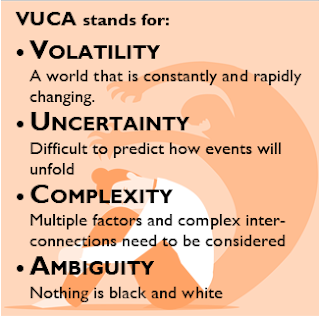How can we thrive in a VUCA world?
In 1987 the US military coined the acronym VUCA to describe the turbulence and unpredictability of the post-Cold War era.

The corporate world has since adopted VUCA to describe challenges in the business environment, and VUCA also has a massive impact at an individual level
Unsure if we’ll have a job as furlough ends
Waiting for a diagnosis, or a date for an operation
Hard to make any long-term plans as we are unsure what the rules will be
Uncertain whether COVID restrictions will impact on wedding or holiday plans
And loads more
Even the uncertainty of waiting for the result of a lateral flow or PCR test can be stressful.
A recent example of VUCA in our world is seen in the potential for delays to NHS operations due to lower-than-expected winds in the UK in 2021. To explain… Some NHS operations need CO2, and 50% of the UK CO2 is a by-product of fertiliser plants... These plants had to be shut down because high demand has increased the price of gas… Demand for gas is high due to a faster than expected recovery from lockdowns, combined with lower than usual output from wind and solar power. The complex web of supply chains that enable our economy to run are invisible to most of us, but we all feel the impact when their normal running is affected by VUCA.
In the last 18 months, we have lived through a higher than usual level of VUCA, and I think we will see a lot more of it in the months and years ahead. Looking back in history there have been lots of similar periods of high VUCA during wars, pandemics, economic crashes, political upheavals, famines, earthquakes, and more. In fact, it’s perhaps far more unusual for the world to be a place of stability and predictability. Volatility, uncertainty, complexity and ambiguity are here to stay; VUCA is the old and new normal, so how do we live in a VUCA world?
One of the ways we often try to manage VUCA is to worry; maybe if we just analyse a problem long enough, work through every possibility, or read every opinion online, we’ll discover a solution and find a way to control the outcome. This rarely, if ever, helps. Chronic worrying won’t give us more control over a VUCA world; it just stops us from being able to enjoy the present, saps our energy, sours our mood, and keeps us awake.
There are some things that I’ve found helpful in coping with life in our VUCA world:
1. Acknowledge how you feel. We sometimes live with an undercurrent of anxiety that we rarely name. Find a space where you can be quiet and reflect on how you are feeling. It can help to write this down in a journal.
2. Share how you’re feeling with people who you can trust to keep it confidential. I’ve written before about the cathartic effect of being listened to.
3. Focus on the short term. It’s easy to get overwhelmed by long term uncertainty, so focus on now and just take the next step. What one thing can you do now, that will help with you or your family’s immediate needs?
4. Where possible, return to familiar places and activities that build you up and bring you happiness
5. Pray... I know I’ve said this before. Telling God how we feel (shouting at him if necessary), and asking for his wisdom, strength and peace (shalom) to help us cope, can make a huge difference.
Before he died Jesus promised his disciples the gift of his shalom (John 14:27). Shalom is a Hebrew word that means peace in English, but in Hebrew it means so much more. Shalom means peace, harmony, wholeness, completeness, and tranquillity. It is a deep sense of being known and loved that can help us cope through times of turbulence and change.
Jesus gave shalom to his disciples to help them navigate the VUCA world of the early church, and it is still something he offers people today.
We will be exploring what this shalom is like as part of our new Explore course that’s available online from the week beginning 11th October (link below). If you are looking for new ways to cope with a VUCA world, you would be welcome to join us.
Rev Barry Jackson

More details on Explore can be found on:
https://explore-bite-sized-christianity-oct21.eventbrite.co.uk



